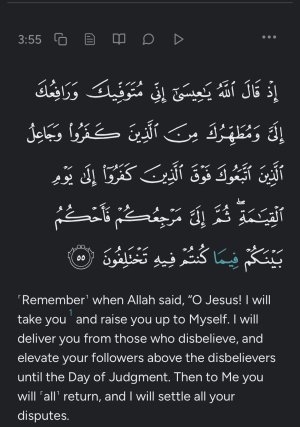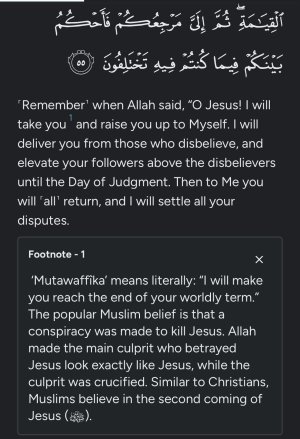Some still believe the Saudis are the custodians of Islam, a belief as outdated as it is convenient.
Good reminder...
We are "Muslims" and Islam belongs to all of us, such as one of the most comprehensive books on Arabic books written fo
r today's students is by someone who converted from
Hinduism to Islam.

Seriously ... what is the point of all that book keeping of past posts ?
Instead of making personal/ad-hominem remarks ... please address these core points that directly pertain to the topic of Quran preservation:
Why did it take over 23 years to complete the Quran if it was from an all-knowing God? Gradual revelation with edits and replacements looks like human legislation, not divine foresight.
How is abrogation (2:106 and 16:101) compatible with the claim that the Quran is eternal, unchanged, and perfect?
Why is there no definitive, preserved list of all abrogated verses — meaning people today rely on later human juristic opinions rather than a clear record from the Prophet's time?
Why was it necessary for Caliph Uthman to standardize the Quran and burn other materials if the original compilation under Abu Bakr was complete and preserved? Note: Even the first edition was not certified by the Prophet. Infact there is no such certified version at all
Sahih Bukhari (4987–4989) shows critical verses being missed during the first compilation, only found with single individuals, and then added. How is this compatible with claims of perfect preservation?
The stoning verse which is reported in Sahih Bukhari 6829 was acknowledged as revealed by God but is absent from the Quran today. How do you reconcile this with the claim that nothing is missing?
Early manuscripts like the Sana'a palimpsest show textual variations, corrections, and erased layers. How do you explain these if the Quran was perfectly preserved from the beginning?
None of the above depends on whether Jay Smith included it in his video or not. None of it disappears just because you dislike who pointed it out and when. If these problems listed above are real ( which they are ) then it doesn’t matter who highlights them.
Truth stands by itself. Focus on the facts and not on who delivers them and what their agenda is or other inane technicalities. Infact me and Jay smith could be the most biased people out there but it does not change the facts we are presenting.
As for your comments about ChatGPT:
Tools do not change facts. You are attacking the messenger instead of answering the message. Every point I have raised is independently verifiable from various Islamic primary sources i.e. Bukhari, Muslim, early Tafsirs, and manuscript studies. No AI tool invents historical records.
If you are confident in your position, address the issues one by one, cleanly and honestly. Instead resorting to personal attacks only show weakness, not strength.
(And in the spirit of honest pointed discussion ... In the next post i will present a very short succinct summary of my position on the topic of Quranic preservation to make it easier for you to respond )
@LordJames
Bottom line:
Under a strict, literal standard of what constitutes change, the traditional claim that "the Quran today is exactly what was given to the Prophet, letter-for-letter" becomes theologically asserted, but historically problematic.
- Muslims argue the process was divinely guided — but that’s a faith-based belief, not a historical fact.
- Historically, editing, selection, standardization, and loss are unavoidable realities, even from Islamic sources themselves.
The historical reality based on Sahih Bukhari, the Sanaa palimpsest (
https://en.wikipedia.org/wiki/Sanaa_manuscript ) and the Quran itself is this:
- The Prophet never personally compiled a final version of the Qur'an and infact admitted to abrogating verses
- After his passing, different companions had varying fragments and memories.
- The first compilation happened under Abu Bakr, based on recollection and gathered materials.
- Years later, Uthman edited, standardized, and burned alternate versions to enforce a single text. ( Therefore implying that this was a very human process not a divine one )
Thus, the Quran we have today was shaped by human collection, selection, and standardization and not a personally finalized or approved by the Prophet.
You can claim that this process was divinely protected, but that's a faith assertion, not a historical fact.
Historically, the Quran underwent human editing and that's per Islamic sources themselves.
( And in the next post I will further shorten this for your convenience )
@uppercut – Desperation Reaches New Heights
Memorization Argument Ignored:
From the very beginning, it was made clear to
@uppercut that millions of people today (in 2025) know the Qur'an
by heart. Every year during the month of Ramadan, in Mosques around the world, the
entire Qur'an is recited from memory — and any error, whether in a word, a verse’s sequence, or even slight pronunciation, is immediately corrected on the spot.
This is something anyone can easily verify by visiting a Mosque or simply watching YouTube videos.
Yet
@uppercut refuses to acknowledge this undeniable fact.
Instead, he makes a staggering claim: he wants us to believe that
millions of non-Arab Muslims (Indians, Pakistanis, Malaysians, Turks, etc.) can memorize the Qur'an in 2025 — but somehow, the people around Prophet Muhammad (peace be upon him), who spoke the language
natively in its purest form, could not!
He wants us to accept this blatant contradiction.
Furthermore,
@uppercut once tried to trap me by asking, "Are you claiming the preservation was all oral?"
Even if it
was purely oral (it wasn’t — it was both oral and written), the fact that a book has been memorized verbatim by millions would still be a miracle of preservation!
In reality, both the oral and written traditions
complemented each other without contradiction.
Why Was the Qur'an Revealed Over 23 Years?
@uppercut also argues that if the Qur'an is divine, why was it revealed gradually over 23 years rather than all at once?
This is a weak and irrelevant point.
The Qur'an has approximately 6,236 verses (give or take). Whether revealed all at once or over decades, the challenges of preserving, recording, and transmitting the text would still exist — so the method of revelation makes no difference to the reliability of preservation.
However, there is a logical reason for gradual revelation: the Qur'an was revealed in response to real-world events — wars, social changes, questions asked by locals, Jews, Christians, and so on.
If the Qur'an had been revealed all at once, much of it would have seemed out of context — speaking to events and issues that hadn’t yet happened!
For instance, verses revealed to address an event in year 17 could not meaningfully exist on day 1 without that event occurring.
Compilation vs Standardization:
Initially,
@uppercut repeated Jay Smith’s claim that the Qur'an was first compiled under the 3rd Caliph Uthman (may God be pleased with him) who died in 652.
Later, he contradicted himself by admitting that it was
compiled under the 1st Caliph Abu Bakr (may God be pleased with him) who died in 634 — but
standardized under Uthman.
Now, he tries to manufacture controversy: "Why was standardization necessary?"
Again, this has been explained repeatedly:
- In Arabic, the word for "book" is كِتَابٌ (kitābun).
- In Urdu/Persian, it’s written as كِتَاب (kitab).
- In Turkish, it’s kitap.
The
standardization under Uthman was to preserve the original Arabic script and its pronunciation —
not to change content.
Copies that reflected local dialects or transliterations were destroyed to ensure that the Qur'an stayed in its pristine, original form.
The goal was to prevent future confusion as Islam spread to non-Arabic speakers.
Even today, when teaching Qur'an to children and adults, students often initially write Arabic in forms they are familiar with based on their native languages (Urdu, Persian, Turkish, Uzbek, etc.) — but eventually transition fully to the standardized Qur'anic Arabic.
This is normal in any educational setting.
Uthman’s standardization was a brilliant step to protect the Qur'an’s integrity across generations and geographies.
Parchments and the Sana'a Palimpsest:
Regarding the Sana'a manuscript, discovered in 1972:
- The Sana'a manuscript contains a palimpsest — meaning an earlier text was erased and a later text written on top.
- Some argue that the erased lower text shows spelling variants, phrasing differences, and minor chapter order variations.
But
@uppercut is being selective.
He wants everyone to ignore the overwhelming
memorization tradition and the
standardized written text, and instead focus on a
student’s notebook draft from early centuries.
The lower text is clearly a
working draft — understandable in a time when writing materials were expensive and precious, and students learned by copying texts repeatedly.
Every teacher, every classroom in history, knows that student notes and early drafts are
always imperfect.
Even if you ignore my years of experience teaching the Qur'an, common sense and everyday experience in any educational field proves this point.
You can watch this video explanation which visually illustrates exactly what I have said above.
@uppercut insistance on Abrogation
I have already answered it
here and
here.
@uppercut has simply skipped over and keeps asking the same set of questions again and again.
@uppercut example of verse of Stoning
My kids are yelling and screaming to go out as it is a nice day so I will address this seperately and in detail.
Here are 14 previous attempts where I have asked
@uppercut to address repeatedly which he is choosing to ignore...
The point of past posts is to keep reminding people on issues which uppercut is continuing to ignore!











